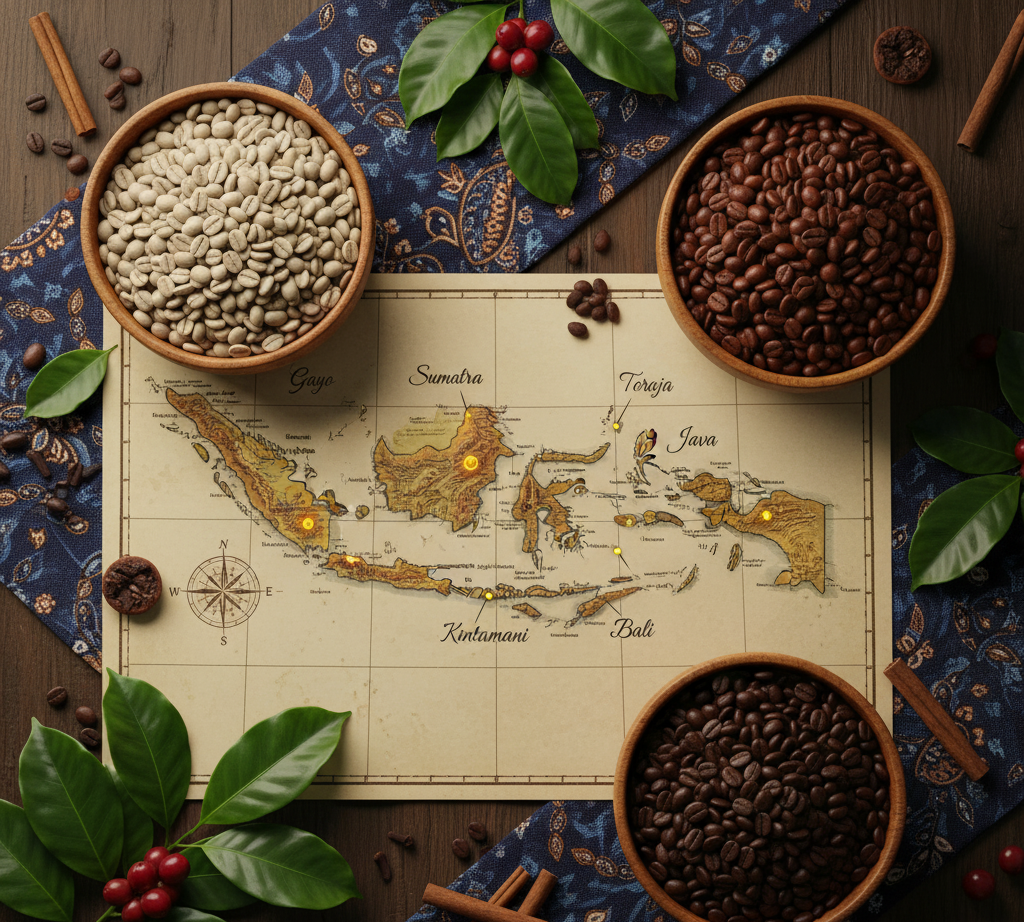
Indonesian Coffee: A Wealth of Flavors from Sabang to Merauke
Share
Indonesia is renowned as one of the world's largest coffee producers and exporters. However, Indonesia's role is much more than mere volume; this archipelago nation is a flavor laboratory, offering coffee varieties with unparalleled character and flavor notes, supported by a strong historical legacy and ideal geographic conditions.
History and the Heritage of the "Coffee Land"
The story of coffee in Indonesia began in the late 17th century during the Dutch colonial era. The VOC (Dutch East India Company) brought Arabica seeds from Yemen and successfully cultivated them on a massive scale, especially on Java. This success made Indonesian coffee so famous that the term "Java" briefly became synonymous with coffee in Europe.
This colonial legacy left traces of coffee plantations across the archipelago. When the leaf rust disease (Hemileia vastatrix) struck, farmers switched to planting the tougher variety, Robusta, which now dominates production in the lowlands.
Indonesia's Iconic Coffee Varieties
Indonesia's unique geography, situated along the Ring of Fire, yields rich volcanic soil. Every island, and even every mountain, produces coffee with its own distinct characteristics (single origin).
| Coffee Type | Island of Origin | Primary Flavor Characteristics |
| Gayo Arabica | Aceh, Sumatra | Strong spice and herbal aroma, thick body, and low acidity. |
| Kintamani Arabica | Bali | Bright acidity like citrus (orange/lemon), light body, and a clean aftertaste. |
| Toraja Arabica | Sulawesi | Medium body, strong, earthy flavor, often containing spice notes. |
| Bajawa Arabica | Flores, NTT | Balanced acidity, hints of nuts, caramel, and herbal notes. |
| Lampung Robusta | Lampung, Sumatra | Very thick body, intense bitter flavor, with dark chocolate undertones. |
| Meranti Liberica | Riau / Kalimantan | Rare, known for its distinctive aroma like jackfruit or smokey notes. |
Why Indonesian Coffee Excels Globally
-
Biodiversity: Indonesia boasts thousands of islands and hundreds of mountains. The differences in microclimates, altitudes, and volcanic soil composition create flavor variations that cannot be replicated by other countries. This is why Indonesian coffee is highly sought after in the specialty coffee market.
-
Unique Processing Method (Wet-Hulled): Specifically in Sumatra (such as Gayo and Mandheling), farmers often use the Wet-Hulled (Giling Basah) processing method. This technique imparts a very thick body, heavy texture, and the characteristic earthy flavor to the beans.
-
Distinctive Single Origins: The global market is now looking for honest and authentic single-origin coffees. Indonesian coffees—from the spicy Gayo to the fruity Kintamani—always offer a pleasant flavor surprise to professional coffee tasters (Q-graders).
Coffee as a Lifestyle and Economic Driver
Today, coffee has transformed into an integral part of the Indonesian lifestyle, marked by the proliferation of modern and traditional coffee shops. This phenomenon not only encourages the culture of "ngopi" (the act of drinking coffee) but also strengthens the economic chain from farmer to barista.
The coffee industry in Indonesia is a reflection of its natural wealth and the dedication of its farmers. Every cup of Indonesian coffee carries a story of cool volcanic mountains, traditional expertise, and an endless diversity of flavors. Indonesian coffee is an agricultural gem that continues to shine on the world stage.
